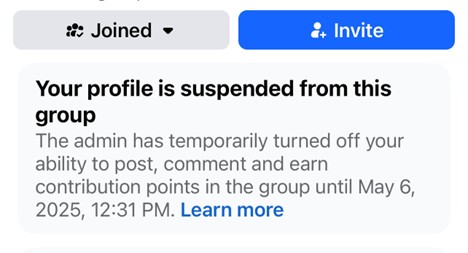- Have you ever had a philosophical difference with a friend or family?
- Have you looked after your brothers despite experiencing a divide?
Recently, I was banned from a group which I had previously considered my friends. Since October 7th, 2023, we have seen an explosion of antisemitism and philosophical differences across society; even within the Jewish community.
My college class has a Facebook Group where we shared fun personal stories and class events. Since October 7th, a group of classmates have hijacked the platform, turning it into an active forum to attack Jews and Israel. Other Jewish classmates and myself tried our best to express a sincere and simple belief that Jews should be able to study freely and without harassment or assault on our alma-mater’s campus. Nevertheless, many classmates actively attacked us and ultimately our voices were silenced. I was banned, and then later I, along with other Jewish classmates, resigned from the group. They can try to silence our voices, but they cannot subdue our spirits.
Given this painful experience, I looked to the Torah for learning and healing.
In Genesis 4:8, Kane killed his brother Abel. The story of Kane and Abel is a sibling rivalry resulting in a senseless killing. However, a deeper reading can reveal a number of other significant themes to explore: good vs. evil, being a brother’s keeper, looking after your flock, and philosophical differences of how to connect land and community.
Kane and Abel is the first example of sibling rivalry in the book of Genesis. It is followed by Isaac and Ishmael, then Jacob and Esau, and finally Joseph and his brothers. Genesis is concluded with the unity among Joseph and his brothers. Joseph is later buried in Israel by Moses.
Exodus teaches us the true power of faith in G-d/Hashem and unity of community. Moses, Miriam, and Aaron are the first truly unified siblings (from their life beginning). Ultimately, they delivered the Children of Israel to the Promised Land with their faith in G-d/Hashem.
Kane and Abel both showed their respect to G-d/Hashem by making a sacrifice. However, they gave their offerings in very different manners. Abel, a shepherd, gave G-d/Hashem his “choicest and finest” by offering the “fattest and firstling of the flock”; carefully chosen and intentionally offered.
Kane, a farmer by contrast, simply picked some fruits and vegetables from among the harvest and gave a paucity of produce to G-d/Hashem.
When G-d/Hashem noticed Kane’s shame, G-d/Hashem spoke to Kane for the first time. Kane felt shame because he recognized that his sacrificial offering was not sincere in comparison to Abel’s. Kane’s feeling of shame is in contrast to Adam and Eve were naked and felt “no shame” while in the Garden of Eden.
G-d/Hashem offered Kane the first example of choosing between good and evil.
Kane chose evil and killed Abel. Kane’s detachment from his violent actions was evident when G-d/Hashem asked about Abel and Kane replied, “Am I my brother’s keeper?”
Kane’s detached and dismissive statement is a stark contrast from Genesis 37 when Jacob (Israel) sends Joseph to check on the “shalom” welfare of his brothers. and Joseph tells a stranger “I am looking for my brothers”.
Joseph was the favorite son of Jacob/Israel. Joseph’s brothers came to have tremendous envy and hatred for him. In Genesis 37:14, Jacob (Israel) sends Joseph to check on the “shalom” welfare of his brothers.
For context, Shalom (Hebrew: שָׁלוֹם shalom) is a Hebrew word meaning peace, harmony, wholeness, completeness, prosperity, welfare and tranquility and can be used to mean both hello and goodbye. (Shalem) שָׁלֵם means whole, complete, and intact.
On the way, Joseph got lost in Shechem. There he happened to run into a stranger. This stranger asked Joseph, “What are you looking for?” Joseph answered, “I am looking for my brothers. Can you tell me where they are pasturing their flocks?” The stranger replied “they have gone from here, for I heard them say “let us go to Dothan” so Joseph followed his brothers and found them at Dothan.
Joseph unlocked his heart by sharing that he was “looking for my brothers”. In spite of the fact his brothers “hated him so that they could not speak a friendly word to him”, Joseph was still open and vulnerable to seeking their “Shalom”.
I have been truly blessed with the love and support of my brothers when we dealt with the loss of our mom and other difficult life circumstances. The lesson of sibling strength in the Exodus story of Miriam, Moses, and Aaron working together to deliver the children of Israel is the final bookend on Kane’s “Am I my brother’s Keeper?” and seeking their “Shalom”.
This concept of Joseph “looking for his brothers”, seeking “Shalom”, and Shalem peace and wholeness is in contrast to the philosophical differences of Kane and Abel. Kane was a farmer, with a fixed mindset and fixed attachment to a specific piece of land. Abel was a shepherd, compassionate towards his flock, with flexible mindset to find “new and welcoming” pastures.
The Shepherd’s flexible mindset to seek new and welcoming pastures is also evident in the stories of Avram, Jacob, Joseph, and Moses seeking spiritual connections in new beginnings for their flock and community.
In shul we recently read Deuteronomy 22:11:
“You shall not wear cloth of wool and linen mixed together.”
(Hebrew: לֹא תִלְבַּשׁ שַׁעַטְנֵז צֶמֶר וּפִשְׁתִּים יַחְדָּו)
Why is this combination of garments prohibited?
Wool is made from sheep and linen is made from plants.
The torah clearly displays the favoring of the biblical leaders being shepherds of the flock as the preferred life instead of farmers of the land.
There are modern examples of Jews being restricted from farming and land ownership. In medieval Europe (12th and 13th Century), Jews were restricted from owning land but allowed to lend money. This example of Jews lending money was central in the Shakesperean merchant of Venice which focused on Shylock who was the Jewish moneylender. In Nazi Germany (1933–1945), under the Nuremberg Laws and other legislation, Jews were gradually stripped of property rights, including the right to own businesses and land.
Given this dichotomy, how do we reconcile the attachment of the Children of Israel to the Land of Israel? How can we combine the philosophies of shepherds of the flock and farmers of the land? I believe that that the answer is Faith in G-d/Hashem.
Adam and Eve left the Garden of Eden and lost their connection with the land. After the killing of Abel, Adam and Eve had another son, Seth. Seth’s descendants later begat Noah. In Genesis 6:9 “Noah was a righteous man, blameless in his generation; Noah walked with G-d/Hashem.” Noah is the first and only person before Abraham to receive this explicit title of “tzadik” (צַדִּיק).
In Genesis 9, the story of Noah’s Ark unfolds. G-d/Hashem instructs Noah to build an Ark (Teva) in order to save his family and a pair of all animal species, because G-d/Hashem was going to flood the earth and destroy all its remaining inhabitants. G-d/Hashem wanted a reset and Noah to begin the world anew. After the flood, G-d/Hashem presented a rainbow to Noah in the sky, signifying his promise to never destroy all life on earth again.
By building the Ark and loading it with his floating flock, Noah became the first ship shepherd and delivered humanity to a new beginning , which Hashem poetically framed with a rainbow in the sky. In Genesis, Hashem promised Abraham that the Children of Israel will be like the stars in the sky and sand in the desert (Genesis 22:17). In Exodus, Moses was also delivered in a Teva (Basket) from the water and delivered the Children of Israel (his flock) across the Sea of Reeds to a new beginning. Hashem promised Moses and the Children of Israel to enter the Land of Israel which would be filled with Milk and Honey (Exodus 3:8).
It is noteworthy that G-d/Hashem helped the Children of Israel evolve from a vision in the sky (rainbow and stars), to delivering them via the water (Noah and Moses), to finally connecting them to the place and Land of Israel (flowing with milk and honey).
Accordingly, the Land of Israel became both a space for living in and a spirit to live by. It is notable that modern day Israel became of thriving agricultural economy based on the establishment of Kibbutzim. Kibbutzim are communities – gathering of flocks of families and friends. These Kibbutzim created a thriving agricultural economy, culture, and community.
The Land of Israel finally became filled with love and labor. Communities connected by faith in Hashem created the fullness of a reconciliation between Kane and Abel. It was a joining of the best of both philosophies (shepherds and farmers).
I want to return to Jacob asking Joseph to look for the “Shalom” of his brothers. This concept of “being your brothers’ keeper” can bring peace and harmony to the world. Let’s explore the words “hole” and “whole” in the context of “Shalom” and “Shalem.” When you add a “w” to “hole” it becomes whole. The “w” represents “We” which is community. Thus adding “We” creates wholeness and enables a community to create peace.
I hope that we can all invite and encourage the collective “we” to join together in seeking both shalom and shalem. The peace and wholeness of our brothers and flocks, despite philosophical differences, to make this a harmonious and compassionate world.
Further Reading:
The Children of Israel’s connection to the Land of Israel: The land of milk and honey. Am Yisrael Chai.
Kibbutzim were foundational in the development of Modern Israel (1920s-1960s) and played an outsized role in agriculture, defense, and politics.
Despite the small population share, kibbutzim contributed heavily to:
- Agricultural output (over 40% of Israel’s farm produce in some decades).
Agricultural Productivity Metrics
- Milk Production: Israeli cows produce approximately 13,000 liters per cow per year, the highest in the world, surpassing North America’s 10,000 liters and Europe’s 6,000 liters.
- Citrus Yield: Israel achieves 261 tons per hectare of citrus fruits, outpacing North America’s 243 tons and Europe’s 211 tons.
- Tomato Yield: Israeli farms produce 300 tons per hectare, significantly higher than the global average of 50 tons.
- Post-Harvest Grain Loss: Israel maintains a remarkably low grain storage loss rate of 0.05%, compared to the global average of 20%.
Global Leadership Areas
- Drip Irrigation: Pioneered by Israeli company Netafim, drip irrigation revolutionized water-efficient agriculture and is now widely adopted worldwide.
- Water Recycling: Israel recycles approximately 86% of its wastewater, leading the world in water reuse, with 80% of its sewage treated and repurposed for agriculture.
- Agricultural Technology (AgTech): Home to over 750 AgTech startups, Israel invests significantly in agricultural innovation, attracting 7% of global AgTech investments.
- Desert Agriculture: Utilizing advanced irrigation and soil management techniques, Israel cultivates over 40% of its crops in desert regions, including melons and jojoba, with the Jordan Valley desert producing nearly half of the world’s jojoba
Japanese Agricultural Growth – Catalyzed by Rice
Japan is another example of how the love of the land can yield outsized agricultural output. In this case, the Japanese love rice. It is a stable of their economy and diet.
Agriculture in the Empire of Japan was an important component of the pre-war Japanese economy. Although Japan had only 16% of its land area under cultivation before the Pacific War, over 45% of households made a living from farming. Japanese cultivated land was mostly dedicated to rice, which accounted for 15% of world rice production in 1937.
Rice was a core component of the food diet. Rice was also the foundation of Sake (a type of alcohol). In the Shogun period, Daimyo paid their taxes with rice. On the eve of the Meiji Restoration in 1868, the nearly 300 semi-autonomous domains across Japan had widely varying tax rates. Some handed over 70 percent of their rice yield to the samurai ruler of the domain.
Harvard Facebook Recap
In the beginning, our Harvard Facebook page was fun and lighthearted. We shared family stories, classmate reunions, and personal advice.
For some reason, after October 7, 2023, our page was hijacked by politics and nearly always negative about Israel and Jews. The moderators never took notice to protect the boundaries. It was a constant stream of negative and provocative posts, largely criticizing Israel and justifying pro-Hamas protestors on campus. Whenever, the very few Jewish members countered by explaining the harassment against Jewish students, the preponderance of the group overwhelmed us.
In 2025 the Trump administration began to investigate the funding of the schools based on the antisemitism on campus. Last week, Harvard released a scathing self-confession of 311 pages of documented antisemitism.
Harvard’s history of antisemitism was first documented in 1719 when the first Jewish Professor Judah Minas was forced to publicly convert to Christianity in Harvard Yard. In the 1922, President Lowell forced the Admissions Office to place a maximum Jewish percentage of the student population at 15%.
Here is an article about how Harvard rewarded pro-Palestinian terror supporters for assaulting a Jewish student on the campus of Harvard Business School.
Rabbi David Volpe, visiting scholar and member of the Harvard antisemitism panel shared his perspectives in this article.
The attacks on Jews on our Facebook page reached a crescendo. Then when the tension heated, a few Jews voiced their support for Jews on Campus. The number of anti-jew speakers grew. The number of posts and replies with personal attacks and antisemitic attacks intensified.
Ultimately, the Jews were overwhelmed and the moderators banned us and we resigned from the group.
What is the lesson?
We were playing chess without seeing the pieces. While is it distressing to have the antisemitism be fully revealed, it is fortunate that we can now see the entire board. Blissful ignorance is not a blessing but a danger. We need to be aware of the possibility of quicksand in order to avoid stepping in it.
I have a deep devotion to Harvard and my Professor and mentor Henry Rosovsky who was the first Jewish member of the Harvard Corporation and first Jewish President of Harvard.
I am hopeful that Harvard President Alan Garber will follow the Jewish ideals of truth and peace in order to radically change Harvard to eliminate antisemitism and to discipline those who perpetrate antisemitic acts in the classroom and on campus.
I look forward to the day when a moral compass returns to the Harvard Campus. I believe that that day will be celebrated by G-d/Hashem by a rainbow over Harvard Yard.
What is the better way to have Harmony of Opposition
I looked to Greek Mythology for another perspective. Harmonia is the Greek deity of harmony. Harmonia is the daughter of Ares (the Greek deity of war) and Aphrodite (the Greek deity of Love). Harmony is truly the connection of the opposites of love and war.
You can read more about the harmony of opposition here.
President Ronald Reagan and Speaker of the House Tip O’Neil
President Ronald Reagan and Speaker of the House Tip O’Neill were ideological enemies, but they learned how to disagree without being disagreeable. This video from March,1986 is a persuasive and poignant example of being friends as people, in spite of being philosophical foes.
Please watch this inspiring and profoundly educational video about how to find harmony in opposition and disagree without being disagreeable.
Here is a report about the “Traumatic invalidation in the Jewish community after October 7”
Enjoy a haiku inspired by this blog:
Brothers turn away,
Silence echoes ancient pain
Be your brother’s guard
You can read another blog about bridging the divide here.






